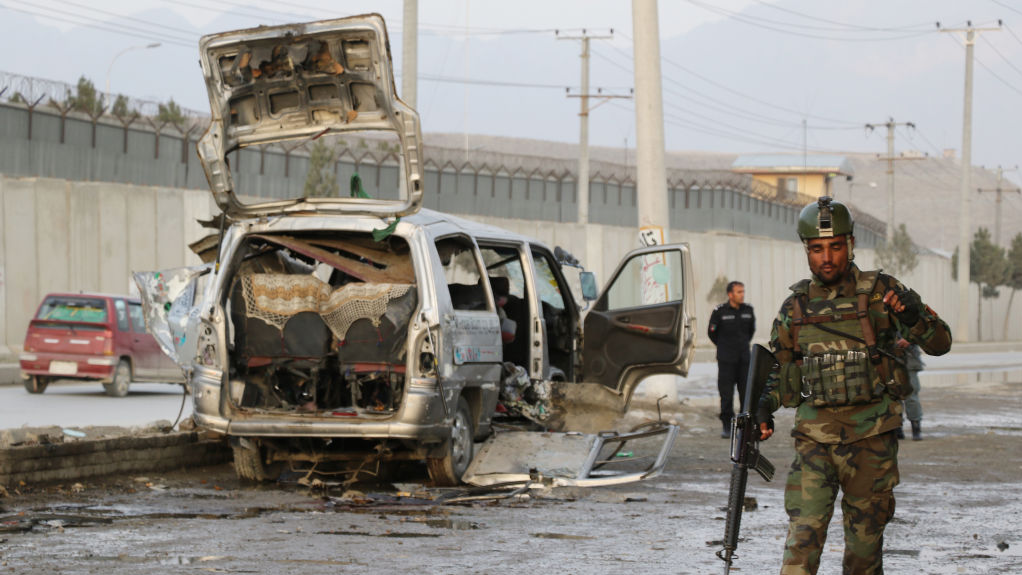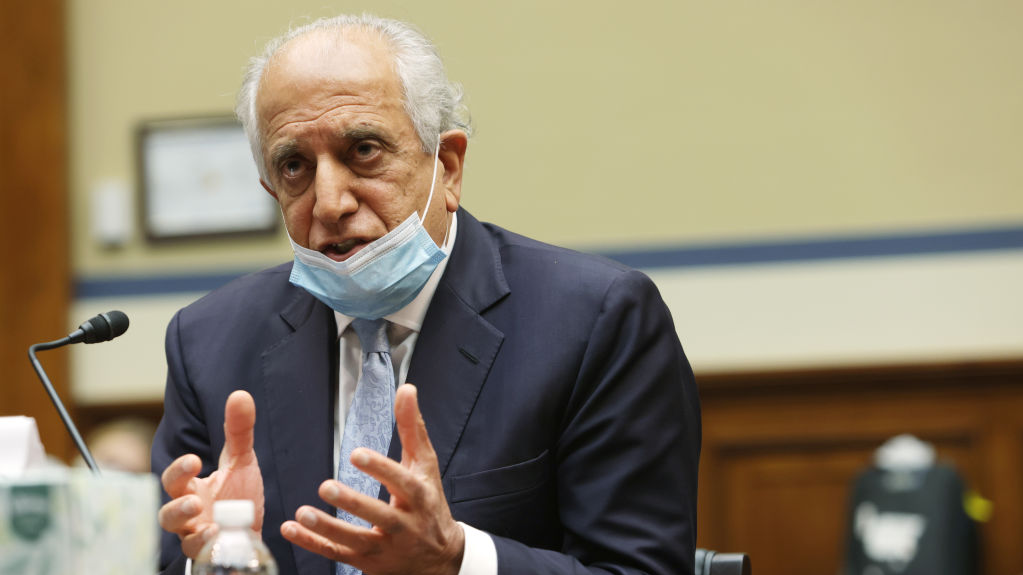
Afghan security officials inspect the scene of a blast in Kabul, Afghanistan, March 7, 2021. /Getty
Afghan security officials inspect the scene of a blast in Kabul, Afghanistan, March 7, 2021. /Getty
Editor's note: Azhar Azam works in a private organization as market and business analyst and writes about geopolitical issues and regional conflicts. The article reflects the author's opinions and not necessarily the views of CGTN.
Notwithstanding changes in the U.S. foreign policy and reverting former President Donald Trump's decisions on some global issues, one of America's international commitments that the current U.S. President Joe Biden should honor is troop withdrawal from Afghanistan within the agreed 14-month timeline to meet the years-long Taliban condition for talks with the Afghan government.
By retaining Zalmay Khalilzad as the U.S. envoy for Afghanistan reconciliation, who negotiated the peace deal between Washington and the Afghan Taliban, and emphasizing on a political solution to the conflict, the Biden administration signaled not to deviate from the treaty. However, lately it's been in shambles on the complete pullout from the battle-weary country.
With the deadline of May 1 approaching fast, a Pentagon report saying "In wake of the February 2020 agreement, all is not well" and noting that the departure of the U.S. and coalition troops could be more devastating to the "survival of the Afghan state" would further test the decision-making ability of the new U.S. government.
The report leaves the U.S. president who is studying the pact his predecessor sealed a year ago in disarray. As reassessments take time in the U.S., the institutional review process to reconsider the withdrawal of the remaining 2,500 soldiers, along with nearly 10,000 NATO forces, additionally threatens to shatter last year's deal on the heels of an arduous diplomatic activity and could go on to halt the Afghan peace process.
An undated letter by the U.S. Secretary of State Anthony Blinken to Afghan President Ashraf Ghani encouraged moving forward settlement quickly through a high-level diplomatic effort under the UN-convened six-nation mission and enforcing a ceasefire between conflicting parties. It also expressed concern that "the security situation will worsen and that the Taliban could make rapid territorial gains." The letter shows an ambivalent Biden team with no clue whatsoever about how to proceed on the critical phase of the intra-Afghan dialogue.
Washington's leaked documents – whether to adhere, negotiate an extension of the U.S. withdrawal or even defy the pact altogether and keep presence in Afghanistan – earlier showed that the Biden administration is in search of political wiggle room through a twin-pronged strategy in the eventuality of military withdrawal or continued presence.
Blinken claimed he did not intend to dictate terms and wanted to enable both sides to reach a peace agreement as rapidly as possible. But the "moonshot" peace plan including formation of an inclusive government was shortly rejected by the Afghan Vice President Amrullah Saleh as he said Kabul will not tolerate a "bossy and imposed peace" and that the U.S. "can make decisions on their troops, not people of Afghanistan."
The U.S. draft proposal for peace in Afghanistan – including principles of Afghan constitution and foreign policy, terms for governing the country during a transition period and agreed conditions for a permanent and comprehensive ceasefire – to jumpstart Afghan peace negotiations may be a good prospect but could derail the process at the same time.
Since Washington appears to extend its stay without an outright endorsement from either the Afghan government or Taliban to the power-sharing formula, armed factions' rejection to the ceasefire and election and every passing day required to remove the U.S. weaponry and equipment from Afghanistan before May 1 could disrupt the peace negotiations.
As a means to circumvent sharp criticism back home, the Biden administration should not bark up the wrong tree – intra-Afghan dialogue – and must not distract itself from the real objective – ending the U.S. military presence in Afghanistan, which was Taliban's fundamental demand to engage in the breakthrough consultations.
After NATO Secretary General Jens Stoltenberg last month said the alliance will not withdraw its forces from Afghanistan "before the time is right" amid U.S. calls to delay the pullout, Taliban's co-founder and lead negotiator Mullah Abdul Ghani Baradar in an open letter addressed to the American public reiterated that the implementation of the Doha agreement was in the interest of all and the most effective way of ending the war.

U.S. Special Envoy for Afghanistan Zalmay Khalilzad testifies during a hearing before a subcommittee of the House Committee on Oversight and Reform, on Capitol Hill in Washington, D.C., September 22, 2020. /Getty
U.S. Special Envoy for Afghanistan Zalmay Khalilzad testifies during a hearing before a subcommittee of the House Committee on Oversight and Reform, on Capitol Hill in Washington, D.C., September 22, 2020. /Getty
The move to defer the troop withdrawal and seek more time to advance the peace process and impose a foreign agenda of forming an interim government would be barren and could push the country toward more instability as well as sabotage the crucial peace talks as Afghans haven't historically welcomed this idea.
If the U.S. is truly committed to end the longest American war and wants to demonstrate urgency in the peace process, it should withdraw forces from Afghanistan and actively support Afghan-led, Afghan-owned negotiations that will more effectively settle the entrenched internal disputes, prevent terrorist groups from launching attacks and lead the way for a peaceful political transition.
The deteriorating peace conditions, reduced international financial support, continued political dissent and re-surging violence with warlords sourcing funds and stockpiling ammunition to secure their territories for a potential civil war – warn the U.S. and international community to realize sensitivity of situation and adopt an objective and impartial stance to accelerate the peace talks among Afghan parties.
What the Biden administration needs to do is complete its review quickly, stick to the promise of troop withdrawal, facilitate a constructive and peaceful reconciliation between the Kabul government and Afghan insurgents and let the onus of success of talks rest with Afghan stakeholders who are best placed to wipe off uncertainties hanging around the future of Afghanistan.
The people of Afghanistan have suffered a lot in attempts to make the country a battlefield of international competition and launch a new cold or proxy war against other states. A full-bodied support from the U.S. and international community for intra-Afghan dialogue and Afghan reconstruction would help them earn the right to live a secure life and improve household economy, which is also tied to withdrawal of foreign troops in an organized way and an extensive global mediation role for an Afghan-led, Afghan-owned peace process.
(If you want to contribute and have specific expertise, please contact us at opinions@cgtn.com.)

